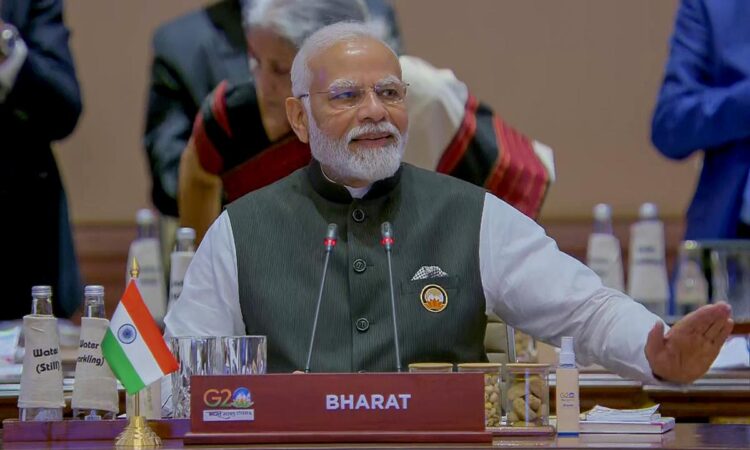
In an unexpected early breakthrough and success for India’s Presidency, G-20 members agreed to a joint statement, forging consensus on the contentious “Ukraine paragraphs”, and also accepted the membership of the African Union into the grouping on Saturday. The final document marks a shift in the position taken by the U.S., the European Union and G-7 countries, and dilutes the harsh criticism of Russia contained in last year’s Bali G-20 statement. Diplomats and officialssaid that the final breakthrough followed a proposal by Indonesia-India-Brazil-South Africa, which The Hindu has seen, that was negotiated until past midnight on Friday, and again on Saturday. The development was announced directly by Prime Minister Narendra Modi, who stopped proceedings during the second session of the Summit on day 1.
Click here to read the full declaration
“I have just got some good news right now,” Mr. Modi said to the leaders gathered. “Due to the hard work of our team and your support, we have achieved consensus on the New Delhi G-20 Leaders’ Summit Declaration. I propose we adopt this Leaders’ declaration,” he added, and then pronounced it adopted with a bang of his gavel, a day before the Summit actually ended.
When asked at a press conference by the G-20 Presidency, both External Affairs Minister S. Jaishankar and India’s G-20 Sherpa said that the consensus had come about due to the stand taken by Indonesia, India, Brazil and South Africa, consecutive hosts of the G-20.
“Eventually everybody helped, but the emerging markets took a lead on this and we have a strong history of working together,” said Mr. Jaishankar, possibly referring to the earlier membership of all four countries in the Non-Aligned Movement. “Bear in mind that there are four developing countries who are Presidents of the G-20 in succession,” he added. Mr. Kant said the negotiations that followed were “very tough and very ruthless” and the issue was clinched due to Prime Minister Modi’s determination for a joint statement.
G-20 Summit, September 9, 2023 | updates
Japan as current President of the G-7+ EU bloc also played a role in bridging the differences, sources said.
Generic reference
As a result, while the Bali document contained paragraphs “condemning” and “deploring” Russia’s invasion of Ukraine in February 2022, the New Delhi Declaration simply refers to differing “national positions” of the various G-20 members on the “war in Ukraine”, with a generic reference that “all states must refrain from the threat or use of force to seek territorial acquisition against the territorial integrity and sovereignty or political independence of any state.”
When asked about the climbdown by the EU and G-7 countries, officials said that the choice they faced was of agreeing to the text or having “no text” at all, which would have led to unfavourable comparisons to the recent BRICS summit in South Africa, where Russia and China had agreed to a joint statement that included the reference to “national positions on Ukraine”.
“Let’s say you had no G-20 statement — newspaper headlines would say the G-20 is finished, and they would be right. G-20 could be replaced by blocs like BRICS and G-7. So in a way by having a statement [we] keep the platform and the organisation alive — and that is the broader picture we must see,” said a senior EU official.
The declaration of 83 paragraphs, that included 8 paragraphs on the Ukraine war and its resultant economic impact, contained many agreements as a part of the Finance Track. Highlighting an agreed plan to strengthen multilateral development banks, a way forward for regulating crypto currencies and the use of digital public infrastructure for financial inclusion as major gains, along with a faster debt distress plan for vulnerable countries, Finance Minister Nirmala Sitharaman said the Indian G-20 Presidency had “walked the talk”. On climate change, the declaration included a “quantum jump” in climate financing from billions of dollars to trillions of dollars, noting the need for “$U.S. 5.8.-5.9 trillion in the pre-2030 period for developing countries as well as $U.S. 4 trillion per year for clean energy technologies by 2030 to reach net zero by 2050”.
Earlier in the day, Mr. Modi also announced the G-20 decision to include the 55-nation African Union, the second regional bloc to join the G-20 after the European Union. Welcoming the African Union’s Chairperson Azaly Assoumani to the table of the leaders with an embrace, Prime Minister Modi said the inclusion of the African bloc would enhance the effectiveness of the G-20. In an interview to The Hindu, Mr. Assoumani had said that Africa would help deal with global challenges within the organisation, but needs investment and skill development assistance from other members.
South African President Cyril Ramaphosa’s spokesperson Vincent Magwenya told reporters in the international media centre at the Bharat Mandapam venue that it was important that the voice of the global south, and of the African continent would no longer be “excluded” from world forums.
(With inputs from Kallol Bhattacherjee, Vikas Dhoot and Jacob Koshy)
month
Please support quality journalism.
Please support quality journalism.



